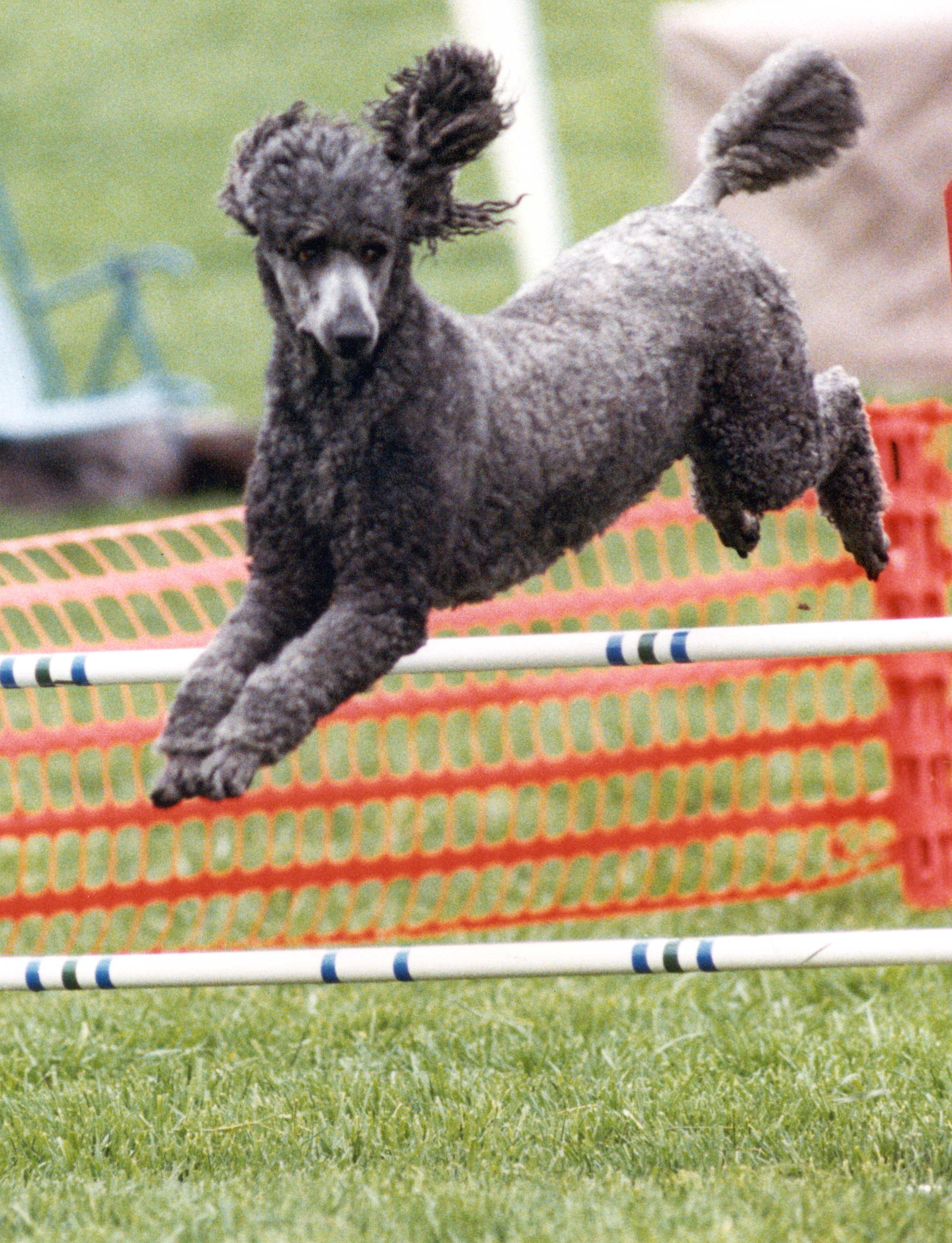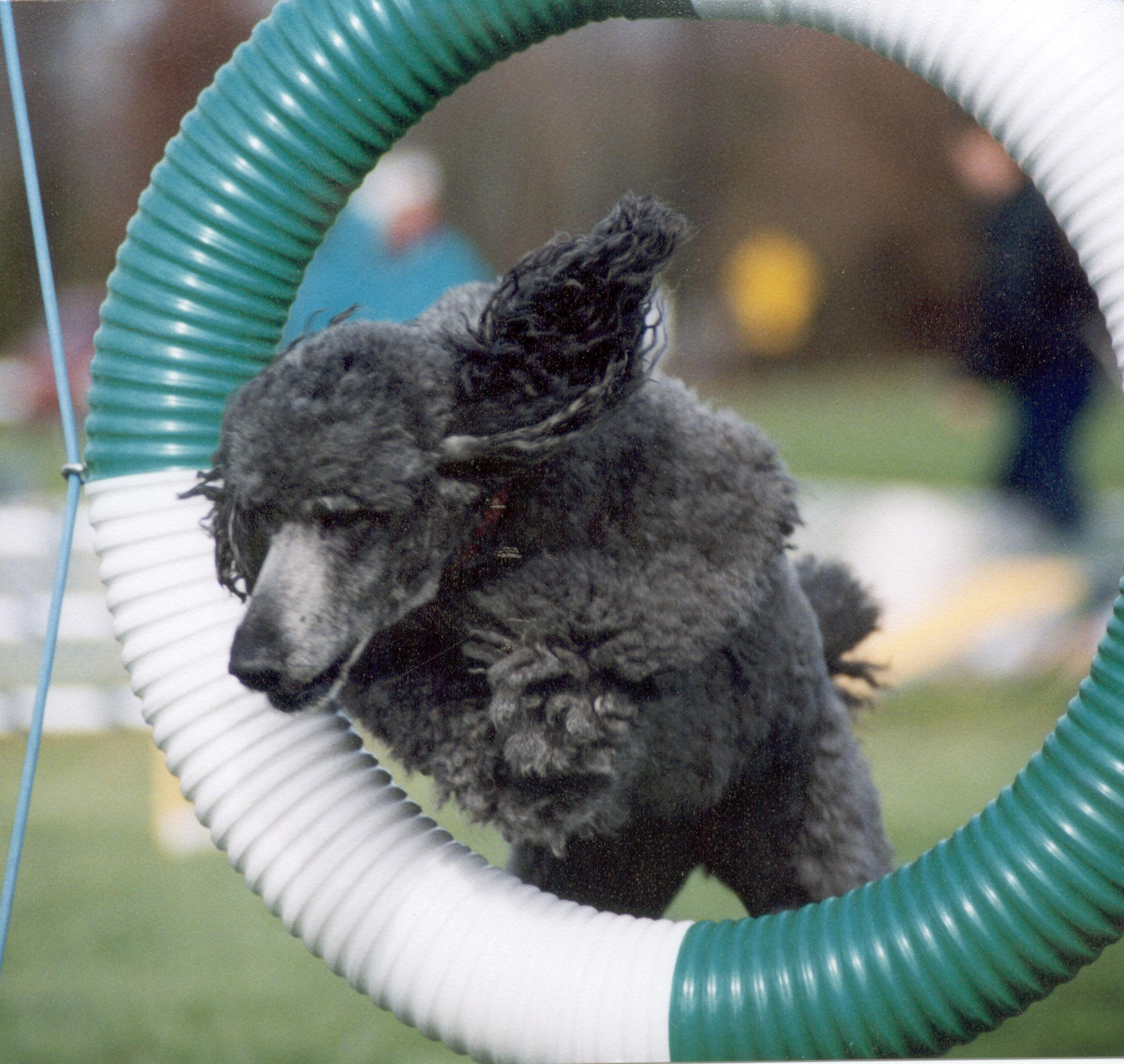
home of

Ranha at Westchester KC, 1995 . . . photo by Ashbey
CH Vogue The Barn Meister ex Thalia's Standing Room Only
March 18, 1994 — December 24, 2004
Ranha held the Versatility in Poodles Versatility Certificate (VC) and was an AKC Canine Good Citizen. She was herding instinct certified in June 2002.
![]()

Over the bar . . . photo by Pam & Sherry
RANHA'S TEST RESULTS
- Hip joint conformation evaluated Good by OFA [PO-7647G27F-T]
- Tested genotypically clear of von Willebrands Disease by VetGen with results registered with OFA [PO-VW7/50/CL/f-T]
- Certified phenotypically clear of heritable eye disease and registered with CERF [POS-714-2003-107] *
- SA unaffected at 3 years 5 months (Hargis) and registered with GDC [GDC9919SA41N8/98]
- Thyroid normal (Dodds)
- No white/cream/apricot/red or brown recessive per DNA (VetGen)
- CHIC #14981
* Although Ranha CERFed clear in 2003, suffered from keratoconjunctivitis sicca (KCS or "dry eye") for several years. KCS is thought to be immune-mediated and, as such, probably has a hereditary component.
Ranha and Boss at PCA June 2003 . . . photo by Ashbey
RANHA'S STORY
Ranha came to us as a special gift from her breeder and our long-time friend in Poodles, Yvonna Stafford Permenter. She was named for the late Sarah (Sally) Featherstone of Lightrock, much as Boomer had been named for the late Red Featherstone a year earlier. Ranha was pointed from the puppy class and easily completed her championship, handled to all her points by Paul Edwards. Following health testing, Ranha was bred to Boomer and whelped a litter of seven on February 7 1997. Of Ranha's three pointed daughters, one was exclusively owner-handled by Sharon Smith of Calais and our own Shamrock went Best of Variety from the Open class.
After getting her pups off to a good start, Ranha went on to train in obedience. In three outings, Ranha had earned two legs toward her CD when she suffered a classic "grand mal" seizure in July 1998.
Ironically, two years earlier Ranha had been enrolled as an unaffected dog in the Florida State University study on epilepsy in Standard Poodles. After several consultations with the study's principal investigator, Dr Barbara Licht, and with our own veterinarians, we had Ranha was spayed and we closely monitored her seizures. By May 1999, there was no doubt that Ranha's seizures were becoming more frequent and severe, and she was started on Phenobarbital, which she took twice a day for the remainder of her life. We later learned that one of her sisters also had a seizure disorder.
Happily, Ranha's excellent seizure control on Pb allowed her to pursue a "second career" in agility. All of her agility titles were earned while on anti-seizure medication. She earned her first two Preferred agility titles in three consecutive trials, with double-Qs and placements in all, including two firsts at PCA in June 2003. While not all dogs with idiopathic epilepsy do as well on anti-seizure medication as Ranha did, she proved that an epilepsy diagnosis needn't mean the end of an agility career.
In December 2004, Ranha suddenly stopped eating, a dire symptom in a dog who until then had never met a meal she didn't like. After several diagnostic procedures, it was found that Ranha had an inoperable gastric adenocarcinoma that had metastasized to other sites. We said our good-byes to her on Christmas Eve.

![]()